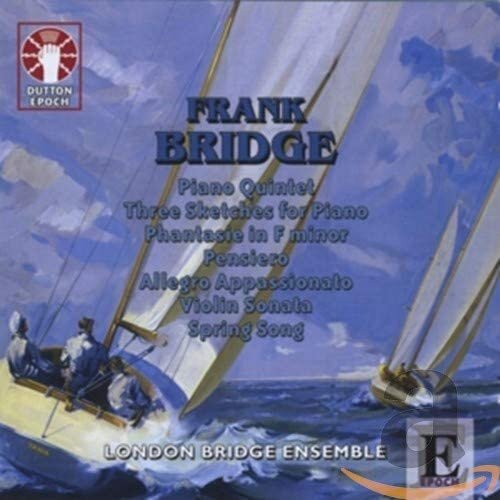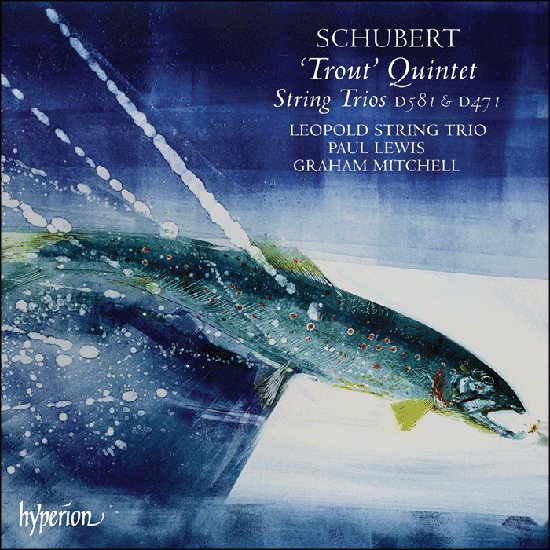
London Bridge Trio / Ensemble
The Leipzig Circle Vol.II SOMM
London Bridge Trio
‘Leipzig – like Vienna, a city of music!.. Such is the basis for this splendid recording on the Somm label, the second one to feature the London Bridge Trio, this time performing piano trios by Mendelssohn and Robert and Clara Schumann.. Throughout, the London Bridge Trio performs with great panache, demonstrating a sensitive but confident approach in this most intimate repertoire. This disc is a delight!’ The Whole Note 2020
The Leipzig Circle Vol.l SOMM
London Bridge Trio
'Lightness of touch and tender intimacy are the keynotes for this CD…it’s a total delight.’ Ivan Hewitt, The Telegraph 2019
‘The performance by Kate Gould and Daniel Tong (Mendelssohn Song Without Words Op 109) is appealing. Gould is adept at maintaining a singing line and shaping it with sensitive expressivity. Her tone is smooth and burnished..’ Daniel Morrison, Fanfare magazine 2019
Dvořák Piano Quartets CHAMPS HILL RECORDS
London Bridge Trio
***** PERFORMANCE
***** RECORDING
‘The London Bridge Trio bring this familiar work to life as if it were an old friend..
‘The players succeed unerringly… This is first-rate reflective chamber music’ BBC Music Magazine 2017
Purchase Options:
Presto Classical
Amazon
Faure Piano Trio etc SONIMAGE
London Bridge Trio
‘Kate Gould’s radiant cello sings with lyrical fervour in the outer movements..’ David Denton, The Strad 2012
Purchase Options:
Amazon
Schumann Songs and Chamber Music SONIMAGE
London Bridge Ensemble
‘This is a disc of a concert and very satisfying it is. The young ensemble, whose name alludes not only to their base, but to their desire to bridge the gap between chamber music and song, and to their admired composer Frank Bridge, perform superbly….’, Paul Driver, Sunday Times 2011
Purchase Options:
Amazon
Frank Bridge Piano Quintet etc DUTTON
London Bridge Ensemble
‘Another generous Bridge helping from this sensitive and stylish outfit.. The poetry, flexibility and ardour displayed by these gifted players held me captive from first note to last.
‘..Kate Gould’s sweetly sung cello in Spring Song (1912) is another treat.. ‘Don’t hesitate for a moment and fingers crossed for more Bridge from this exemplary team!’ Andrew Achenbach, Gramophone 2010
‘the light and lyrical ‘Spring Song’.. is played exquisitely by cellist Kate Gould.’ American Record Guide 2010
Purchase Options:
Dutton Vocalion
Frank Bridge Chamber works and Song DUTTON
London Bridge Ensemble
‘What’s more, in the glorious Phantasie Quartet of 1910 these stylish newcomers deserve a place at the top table next to such exalted predecessors as Benjamin Britten with members of the Amadeus Quartet.. Elsewhere the programme allows each instrumentalist to shine: Kate Gould sparkles in the flirtatious Scherzo (1901)..’ Gramophone 2008
‘If you're after an all Bridge disc [list of pieces]... all in excellent performances, then look no further…’ BBC Radio 3 CD Review
Purchase Options:
Dutton Vocalion
Bach Goldberg Variations HYPERION RECORDS
Leopold String Trio
‘This arrangement has been recorded several times … but the Leopold's belated entry into the field eclipses all others … the hushed withdrawing of the Aria's ultimate reprise is spellbinding … for listeners, there are times when holding one's breath is inescapable’ BBC Music Magazine 2011
Purchase Options:
Hyperion Records
Amazon
Amazon alt
Beethoven: String Trio & Serenade
Purchase Options:
Hyperion Records
Amazon
Beethoven String Trios - 2 discs - HYPERION RECORDS
Leopold String Trio
‘This repertoire has been recorded by some world-famous artists in the past, but no performances have given me as much pleasure as these. A real treat’ BBC Music Magazine
‘An outstanding pair of discs’ The Daily Telegraph
‘The most sensitive reportage that these works have enjoyed since the advent of digital recording’ The Independent
‘A remarkably gifted young ensemble who bring classical elegance to these glorious works’ Classic CD
‘[A] startlingly good debut’ The Scotsman
‘Here is the finest string ensemble in Britain’ Daily Mail
‘One of the best and most beautiful ensembles to emerge blinking into the sunlight from London's conservatoires in recent years’ The Evening Standard
Purchase Options:
Hyperion Records
Amazon
Amazon (with additional CD)
Brahms Piano Quartets HYPERION RECORDS
Leopold String Trio and Marc-Andre Hamelin, piano
‘I doubt we will ever hear better recorded performances of the three piano quartets than we have here... Kate Gould's cello in the moving slow movements of Nos 2 and 3 is breathtakingly beautiful, while in No 1, Marc-André Hamelin's verve and articulation will make you smile and scratch your head in wonder.’ Classic FM Magazine 2006
‘A delight from start to finish: this is such cultivated and characterized playing, which becomes quite exultant in the finale. It's also beautifully recorded by Hyperion. Given that, this new set can take a well-earned place at the top of recommendations of these three works.’ International Record Review 2006
Purchase Options:
Hyperion Records
Amazon
Dohnányi, Martinu, Schoenberg HYPERION RECORDS
Leopold String Trio
‘Three players whose persuasive musicianship is consistently revealing.
‘The beauty of this recording by the Leopold String Trio is the way the players draw out the music’s full harmonic implications, more so than the Juilliards (on their second recording) or the LaSalles…All manner of devices are used in the pursuit of maximum colour, including col legno, harmonics and pizzicato…the Leopolds score in their rapturous playing of the quieter music.
‘…the Leopold Trio have…a warm, pooled tone, a relaxed demeanour and an ability to search out the subtler aspects of the score. The sound is consistently excellent…’ Rob Cowan, Gramophone Magazine 2005
Purchase Options:
Hyperion Records
Amazon
Taneyev String Trios HYPERION RECORDS
Leopold String Trio
‘It would be hard to over-praise the Leopold Trio's performances. Agility and all-round aplomb … Warmth and colour … Structural and idiomatic awareness …'' Gramophone Magazine 2008
'The Leopold String Trio … are arguably the leading such trio in the world … Taneyev was one of the greatest Russian musicians of his time… The three string trios on this Hyperion CD make a very important contribution to our knowledge of Russian chamber music of the period… The music is inherently Russian, beautifully composed and so varied in convincing expression that the attentive listener is at once drawn into the composer's world. This is wonderful music, wonderfully performed and recorded … Highly recommended' International Record Review 2008
'There is … an individual creative spark, urgency and textural richness that the Leopolds communicate with sensitivity and terrific panache' Daily Telegraph 2008
'Listening to the three trios that the Leopold String Trio present with such commitment and persuasiveness leaves no doubt as to Taneyev's contrapuntal ingenuity and resource … Excellent recorded sound makes this a rewarding issue in every way' BBC Music Magazine 2008
Purchase Options:
Hyperion Records
Amazon
Mozart Divertimento K568 HYPERION RECORDS
Leopold String Trio
‘The Grumiaux Trio’s 1960s recording has dominated the catalogue, and challengers have been few. This account .. is the most glowing and perceptive account since the Grumiaux’s, and deserves to win friends for this wonderful music among a younger generation of music-lovers.’ The Sunday Times, September 2001
‘This new recording from the Leopold Trio seriously challenges the 1967 Grumiaux version on Philips, long the benchmark for many Mozart lovers. …. the Leopold is a more democratic group, the players matching and reacting to each other’s phrasing with rare empathy. Their performance as a whole is gentler and more classically chaste than the Grumiaux; but, with scrupulous attention to Mozart’s dynamics and articulation, they characterise at least as vividly, whether in the remote modulations in the first-movement development (enhanced by the players’ veiled sotto voce colouring), the rarefied intensity of the Adagio, or the range of mood and colour they bring to the fifth-movement variations. For its uncommonly refined and democratic interplay, this new disc now eclipses Grumiaux as my top recommendation…’ Richard Wigmore, BBC Music Magazine 2001
Purchase Options:
Hyperion Records
Amazon
Mozart Piano Quartets HYPERION RECORDS
Leopold String Trio and Paul Lewis, piano
Classical CD of the week
‘When these musicians played these quartets at the 2000 Edinburgh Festival, I wrote that ‘every bar sounded fresh-minted in the hands of these wonderful young artists and Lewis is a star in the making: a born stylist’. Almost four years on, their performances retain the same youthful freshness.’ Hugh Canning, The Sunday Times 2003
CD of the week
‘There have been other memorable recordings of these glorious pieces, but few, if any, can rival this new disc’s combination of deep musical understanding with a sense of fresh, delighted discovery.’ Richard Wigmore, The Daily Telegraph 2003
Record of the Month
‘The player’s close spontaneous rapport, challenging or coaxing in dialogue and dovetailing their lyrical lines with natural grace, make even the augmented Beaux Arts Trio sound a shade studied….But for all the delicacy of playing, the music’s darkness and passion are fully expressed, whether in the mounting tension of the development or the turbulence of the coda. ..for freshness, insight and sheer beauty of tone and phrase, this new disc takes the palm.’ Richard Wigmore, BBC Music Magazine 2003
Editor’s Choice
‘There have been several excellent recordings recently of these two works, mostly on period instruments. Here’s another, on modern instruments, and with performances quite out of the ordinary.. A real winner, this disc: warmly recommended.’ Stanley Sadie, Gramophone Magazine 2003
Editors Choice
‘Remember the old adage that young artists should steer clear of indisputably ‘classic’ repertoire until they’ve lived long enough to have something genuinely original to say? Well either it’s plain wrong, or musicians are maturing faster these days. Take Mozart’s piano quartets, two absolute pinnacles of the medium: here we have a superb issue from young, world-class players, Paul Lewis and the Leopold String Trio. And they not only get to the heart of these pieces to a degree I’ve rarely encountered, but they take on such stalwarts of the CD catalogue as the expanded Beaux Arts Trio, Clifford Curzon and members of the Amadeus Quartet, not to mention the two versions by Isaac Stern and friends and top them all. You don’t have to listen far into the first movement of the G minor Quartet to discover passion, grace, pathos, brilliance, and a superb balance of shape and inner detail as the players spark off one another. It’s pure joy from first to last, and I urge you to add it to your shelves.’ Harriet Smith, BBC Music Magazine 2003
Purchase Options:
Hyperion Records
Amazon
Schubert Trout Quintet and String Trios HYPERION RECORDS
Leopold String Trio, Paul Lewis, piano and Graham Mitchell, bass
Instrumental Disc of the Month
‘one of the finest modern Trouts available. As with their Mozart, their Schubert benefits from scrupulous attention to detail, a keen sense of the music's drama and a deeply rewarding expressive response to this imperishable masterpiece … exquisitely played.’ Hugh Canning, The Sunday Times 2006
‘The Leopold String Trio understands Schubert's pursuit of beauty and the sublime, enhanced in their joyful 'Trout' Quintet partnership by pianist Paul Lewis and double-bassist Graham Mitchell. This 'Trout' surely ranks high on the all-time list of Schubert chamber music recordings.’ MusicWeek
‘Their interpretation is compelling for its spontaneity and compelling detail. It shows them to be completely within the Schubertian sensibility and encompasses the piece's mood changes with subtlety, capturing its lyricism with true Schubertian bonhomie.’ The Strad
Purchase Options:
Hyperion Records
Amazon















